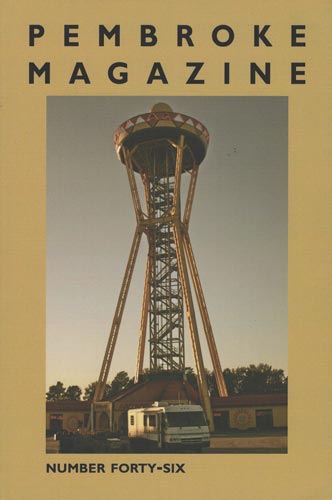Pembroke Magazine – 2014
Dysfunctional families, human nature, and the forces of Mother Nature are all prominent topics in this issue of Pembroke Magazine. While stories with happy endings, delivered with bows on top, are often sought after in today’s culture, it is refreshing and entertaining to read essays, stories, and poetry that have no real resolution.
Dysfunctional families, human nature, and the forces of Mother Nature are all prominent topics in this issue of Pembroke Magazine. While stories with happy endings, delivered with bows on top, are often sought after in today’s culture, it is refreshing and entertaining to read essays, stories, and poetry that have no real resolution. Instead of leaving the reader satisfied with a cliché happy ending, the stories in Pembroke Magazine leave the reader satisfied with no resolution, forcing them to think about the piece again and again.
Unlike other journals that have poetry, fiction, and nonfiction sprinkled throughout the journal, Pembroke Magazine separates their submissions into sections, making it easier for the reader to jump right into what they enjoy most. The first forty pages are dedicated to poetry in which poets like Amanda Newall tackle rough, real-life issues such as soldiers coming home from war in her poem entitled “Flight.” With images including “stretchers [that] rattle like teeth” and Marines “packed like cargo in the plane’s steel belly,” it is almost impossible not to become interested in the life of Adam, one of the narrator’s former students. Newall continues about the wellbeing of Adam in another poem entitled “McGuire VA Hospital” in which Adam arrives at the hospital but the reader is left wondering “if Adam’s any safer here than in the war zone.” The reader becomes invested in the character of Adam, and therefore is invested in his life.
The biggest strength in this issue of Pembroke Magazine is the quality of work in the fiction section. In the short yet attention-grabbing fiction piece by Sarah Kuntz Jones entitled “Lost Souls,” a town becomes overrun with bats after a building is torn down. Jones gives us powerful images such as people walking in the streets needing umbrellas to keep the bats from getting caught in their hair. We are never given a resolution, rather we are left with the “townspeople haunted by belly-aching fears, dream[ing] of uneasiness, of needle-like teeth, and of the mournful cries of the displaced.” However, this ending is oddly satisfying to the reader because while the townspeople are suffering and are considered the lost souls, we slowly come to the realization that the townspeople and the bats have more in common than meets the eye.
A flash fiction piece by Charles Rafferty entitled “An Incident at the Stamford Train Station” was a quick read, but one I could take a moment to look away from. The entire story takes place within less than three paragraphs as well as within less than a few seconds. We are in the mind of the narrator as he “sees a woman [he] know[s] on the opposite platform whom [he has] not seen in years.” The perfectly paced story continues with the narrator mustering up the courage to speak to the woman, all while boarding a different train than the familiar stranger. By the time he regains his state of mind, “the bells of the closing doors go off” and the “trains begin moving in opposite directions,” leaving the conversation between the two nonexistent, and the issue and tension unresolved. This unresolved issue is satisfying to the reader, in the sense that the story reoccurs later in our mind, forcing us to ask why the quiet passenger never attempted to strike up a conversation with the distant acquaintance.
In a longer piece entitled “When You’re Down by the River,” Christopher Lewis explores writing in second person, allowing the reader to become a part of the story while he or she grapples with dealing with divorced parents and the father’s new love interest. The story forces the reader into difficult situations surrounding human nature and the dysfunctional family unit. For example, Lowe gives us lines like “you pretend not to hear the sounds Rachel makes or the last, hard grunt that comes from your father.” While we are highly uncomfortable, it is at this point that the reader knows they will not get a cliché happy ending, and we are satisfied with that. Lowe leaves us (the reader and character of the story) wishing the river would “carry you out into that faster water.”
While I only mentioned several of my favorite poems and short stories, this issue includes a variety of styles and many other strong pieces by Joey R. Poole, Keith Kopka, M. E. Silverman, Noel Sloboda, John Warner Smith, Mary Bess Dunn, and Robert Avery. Additionally, there are interviews: Forrest Anderson’s, “A Habit of Abstract Empathy: An Interview with Holly Goddard Jones” as well as Jessica Pitchford’s interview “Scissors and Glue: A Conversation with Jill McCorkle.”[www.pembrokemagazine.com]
Reviewer bio: Samantha Riley is a first year graduate student of the MA in Writing program at Coastal Carolina University. She graduated in 2014 with her B.A in English. Upon graduating from her current program she plans on continuing her education and getting her PhD in Composition and Rhetoric.





